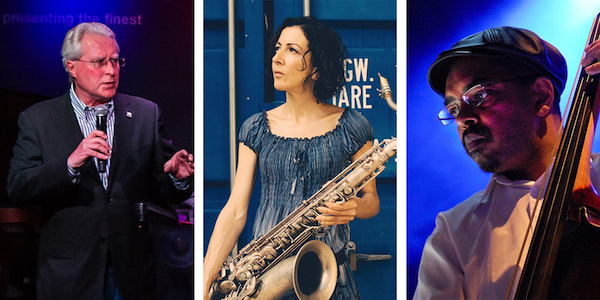Jan 13, 2026 2:09 PM
More Trump-Kennedy Center Cancellations
The fallout from the renaming of the John F. Kennedy Center for the Performing Arts to include President Donald…

Ubuntu label head Martin Hummel (left), saxophonist Tori Freestone and bassist Gary Crosby
(Photo: Carl Hyde/Rob Blackham/Howard Denner)But does Stapleton think there’s something intrinsically different in the music of his American signees?
“American artists come from the land where the music was created. And so, there is definitely a different aura around American musicians, compared to Europeans. It’s such a different music in a way. And, you know, if you compare what’s going on in Finland to what’s going on New York, it’s a completely different approach. There’s a different confidence; there’s a different perception of the whole scene.”
There is, of course, a distinction to be made in the contrasts among music scenes, the movement of people and ideas.
THE EMPIRE WINDRUSH brought hundreds of people from Jamaica to Tilbury Dock, Essex, in 1948. Many of the arrivals built their homes and communities in South London, introducing locals to ska, rock-steady, bluebeat and reggae, as well as unique takes on jazz. In South London today, artists who can trace their families back to the Windrush immigrants are at the forefront of a boundary-pushing jazz movement—a sound that has a particular relationship to the U.K.
Gary Crosby knows all about that sound. Awarded the Order of the British Empire by Queen Elizabeth II for his contributions to music in 2009, he also was given The Queen’s Medal for Music in 2018—the first jazz musician and first person of color to earn the honor. And as a bassist, composer, arranger and cofounder of Tomorrow’s Warriors, a nonprofit organization, Crosby has nurtured many of London’s most prominent contemporary talents.
“There are a couple of particular distinctions between jazz traditions in the U.S. and the U.K., but I wouldn’t say that they’re unbreakable rules,” Crosby explained. “Obviously, the American jazz tradition is the tradition of the music. Whereas in the U.K. over the past 50 years, especially with the influx of Caribbean and African musicians that have been engaging in the music, it’s been quite—I wouldn’t say unique to London—but it’s been celebrated.”
Crosby continued, “The African and Caribbean involvement is critically important to England, and I think contributed a lot to making some elements of jazz connect with world music.”
As someone who also has run a record label—Dune Music, which he founded in 1991 with Janine Irons, his wife and business partner—Crosby understands what it takes to succeed.
“Martin Hummel, Michael Janisch, Dave Stapleton: These are people I respect, as people who’ve helped push the British scene with their insightfulness and support. You know, just the energy to do it,” Crosby said. “I mean, to start a record company—this is not an easy task. It’s not a joke. You’re not really doing it for money. There isn’t any money. You’re doing it for a mixture of history documenting, obviously earning a living—and because you love the music. Regardless of who they sign, there must be a reason why they get involved in recording. It has its challenges; I admire anyone who gets involved.”
One of the greatest achievements of any label is to chronicle history—the movement and flow of culture—and to help listeners understand both the present day and our collective past. Hummel, Janisch and Stapleton have fostered and championed a number of albums that provide an archive of how the American jazz tradition lives, breathes and evolves in the hands of U.K. performers who continue to develop their own unique roots, stems and branches of the music. They tie together traditions from around the world—especially from two sides of the Atlantic. DB
Correction: In an earlier version of this story, Mark Guiliana’s connection to the Whirlwind label was misstated. The drummer hasn’t issued a leader date with the imprint. DownBeat regrets the error.

Belá Fleck during an interview with Fredrika Whitfield on CNN.
Jan 13, 2026 2:09 PM
The fallout from the renaming of the John F. Kennedy Center for the Performing Arts to include President Donald…

Peplowski first came to prominence in legacy swing bands, including the final iteration of the Benny Goodman Orchestra, before beginning a solo career in the late 1980s.
Feb 3, 2026 12:10 AM
Ken Peplowski, a clarinetist and tenor saxophonist who straddled the worlds of traditional and modern jazz, died Feb. 2…

The success of Oregon’s first album, 1971’s Music Of Another Present Era, allowed Towner to establish a solo career.
Jan 19, 2026 5:02 PM
Ralph Towner, a guitarist and composer who blended multiple genres, including jazz — and throughout them all remained…

Rico’s Anti-Microbial Instrument Swab
Jan 19, 2026 2:48 PM
With this year’s NAMM Show right around the corner, we can look forward to plenty of new and innovative instruments…

Richie Beirach was particularly renowned for his approach to chromatic harmony, which he used to improvise reharmonizations of originals and standards.
Jan 27, 2026 11:19 AM
Richie Beirach, a pianist and composer who channeled a knowledge of modern classical music into his jazz practice,…